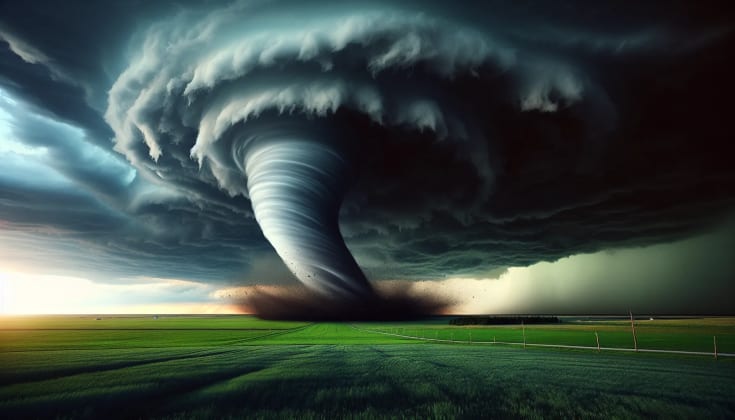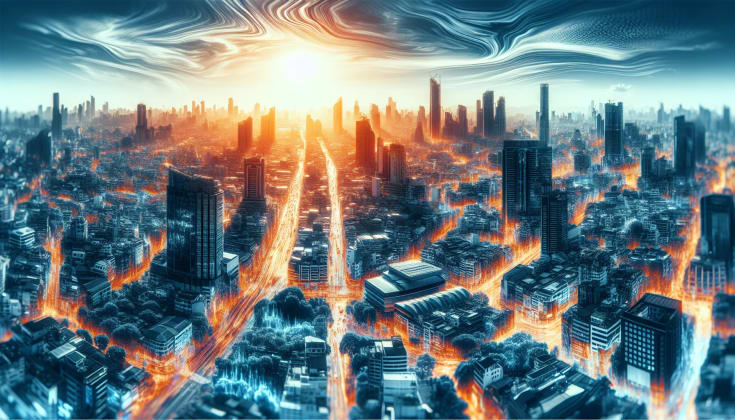What Are Extreme Weather Events and How Are They Changing in the 21st Century?
Dive into the world of extreme weather events, their causes, impacts, and how climate change is reshaping these phenomena in our modern era.
I’ve witnessed firsthand the raw power of nature, and let me tell you, extreme weather events are not just intensifying – they’re redefining our relationship with the planet. As a Christian weather enthusiast and educator, I’ve spent years studying these phenomena, and the changes we’re seeing are nothing short of biblical in proportion.
In 2023 alone, the United States experienced a record-breaking 25 weather and climate disasters that each exceeded $1 billion in damages. This isn’t just a statistic; it’s a wake-up call. Our changing climate is reshaping the very fabric of our weather patterns, and as stewards of God’s creation, we need to understand what’s happening and why.
In this comprehensive guide, we’ll explore:
- What defines an extreme weather event
- The types of extreme weather we’re facing
- How climate change is amplifying these events
- The impact on communities and ecosystems
- What we can do as individuals and as a society to prepare and respond
As someone who’s chased storms and studied weather patterns for years, I understand the fascination and fear these events can inspire. Whether you’re a weather enthusiast, a concerned citizen, or simply someone trying to make sense of the changing world around us, this article will provide you with the knowledge and insights you need.
“The heavens declare the glory of God; the skies proclaim the work of his hands.” - Psalm 19:1
Indeed, the skies are speaking to us now more than ever. Let’s listen and learn.
What Defines an Extreme Weather Event?
Extreme weather events are not your average rainy day or chilly evening. These are meteorological occurrences that fall in the outermost ranges of historical measurements. In other words, they’re the outliers, the record-breakers, the events that make us stop and take notice.
Criteria for Extreme Weather:
- Intensity: The event is significantly more severe than average.
- Duration: It lasts longer than typical weather patterns.
- Frequency: It occurs more often than historical norms suggest.
- Impact: The event causes substantial damage or disruption to human activities.
“For nation will rise against nation, and kingdom against kingdom. There will be earthquakes in various places; there will be famines. These are but the beginning of the birth pains.” - Mark 13:8
While this verse speaks of end times, it reminds us that natural disasters have long been recognized as significant events in human history.
Types of Extreme Weather Events
Let’s break down some of the most impactful extreme weather events we’re seeing in the 21st century:
1. Hurricanes and Tropical Cyclones
Hurricanes are nature’s powerhouses, fueled by warm ocean waters and capable of devastating coastal areas. In recent years, we’ve seen:
- Increased intensity: Warmer oceans are providing more energy for these storms.
- Rapid intensification: Hurricanes are strengthening faster, giving less time for preparation.
- Slower movement: Some hurricanes are lingering longer over land, increasing rainfall and flooding.
2. Tornadoes and Severe Thunderstorms
While tornadoes have always been a part of life in certain regions, we’re seeing changes in their behavior:
- Tornado Alley is shifting: The traditional “Tornado Alley” in the U.S. is expanding eastward.
- Tornado outbreaks: We’re experiencing more instances of multiple tornadoes in a single weather event.
- Off-season occurrences: Tornadoes are appearing outside their typical seasonal windows.
3. Extreme Heat Waves
Heat waves are becoming more frequent, more intense, and longer-lasting:
- Urban heat islands: Cities are experiencing temperatures significantly higher than surrounding areas.
- Health impacts: Extreme heat is leading to increased hospitalizations and heat-related deaths.
- Infrastructure strain: Power grids are being pushed to their limits during peak heat events.
4. Extreme Cold and Winter Storms
Despite global warming, extreme cold events are still occurring, often with surprising intensity:
- Polar vortex disruptions: Changes in Arctic temperatures are leading to more frequent cold air outbreaks in temperate regions.
- Increased snowfall: Warmer air can hold more moisture, leading to heavier snowfalls in some areas.
- Ice storms: Fluctuating temperatures can lead to more frequent and severe ice storms.
5. Drought and Wildfires
Prolonged dry spells are becoming more common, with cascading effects:
- Megadroughts: Some regions are experiencing droughts lasting decades.
- Wildfire seasons: Fire seasons are starting earlier, ending later, and burning more intensely.
- Water scarcity: Droughts are straining water resources for agriculture and urban areas alike.
The Role of Climate Change
It’s impossible to discuss extreme weather events in the 21st century without addressing the elephant in the room: climate change. As Christians, we’re called to be good stewards of God’s creation, and understanding how our actions are impacting the planet is crucial.
Key Climate Change Factors Affecting Weather:
- Rising Global Temperatures: The Earth’s average temperature has increased by about 1.1°C since pre-industrial times.
- Ocean Warming: Oceans absorb about 90% of the excess heat from global warming.
- Sea Level Rise: Melting ice caps and thermal expansion of oceans are raising sea levels.
- Changes in Atmospheric Circulation: Warming is altering global wind patterns and jet streams.
“The earth is the Lord’s and the fullness thereof, the world and those who dwell therein.” - Psalm 24:1
This verse reminds us of our responsibility to care for the Earth and all its inhabitants.
How Climate Change Amplifies Extreme Weather:
- More Energy in the System: Warmer air and oceans provide more fuel for storms.
- Increased Water Vapor: Warmer air holds more moisture, leading to heavier precipitation events.
- Altered Weather Patterns: Changes in atmospheric circulation can lead to persistent weather patterns, increasing the likelihood of droughts, heat waves, and cold spells.
- Feedback Loops: Some extreme weather events can create conditions that lead to more extreme weather, creating a cycle of intensification.
Impacts on Communities and Ecosystems
The consequences of extreme weather events extend far beyond the immediate destruction they cause:
Human Impacts:
- Loss of Life: Extreme events can lead to fatalities through direct and indirect means.
- Economic Losses: Damage to infrastructure and disruption of business can have long-lasting economic impacts.
- Displacement: Severe weather events can force people to leave their homes, sometimes permanently.
- Mental Health: The stress and trauma of experiencing extreme weather can have lasting psychological effects.
Ecological Impacts:
- Habitat Destruction: Extreme events can drastically alter or destroy natural habitats.
- Species Migration: Changing weather patterns are forcing species to move to new areas, disrupting ecosystems.
- Biodiversity Loss: Some species may not be able to adapt quickly enough to changing conditions.
“The creation waits in eager expectation for the children of God to be revealed.” - Romans 8:19
This verse speaks to the interconnectedness of humanity and nature, reminding us that our actions have far-reaching consequences.
Preparing for and Responding to Extreme Weather
As extreme weather events become more common, it’s crucial that we as individuals and communities are prepared:
Individual Preparedness:
- Stay Informed: Keep up-to-date with weather forecasts and warnings. Consider using a reliable weather app like Optic Weather for real-time updates.
- Have an Emergency Kit: Stock up on essentials like water, non-perishable food, first-aid supplies, and batteries.
- Know Your Risks: Understand the specific weather risks in your area and plan accordingly.
- Have a Plan: Develop and practice an emergency plan with your family or household.
Community Resilience:
- Infrastructure Improvements: Communities need to invest in resilient infrastructure that can withstand extreme weather.
- Early Warning Systems: Implementing advanced warning systems can save lives.
- Community Education: Regular drills and information sessions can help communities prepare for extreme events.
- Sustainable Development: Building with extreme weather in mind can reduce long-term vulnerabilities.
The Christian Perspective on Extreme Weather
As Christians, we’re called to be both stewards of the Earth and beacons of hope in challenging times:
- Stewardship: We have a responsibility to care for God’s creation and mitigate the human-caused factors exacerbating extreme weather.
- Compassion: Extreme weather events often hit vulnerable populations hardest. We’re called to help those in need.
- Hope: Even in the face of daunting climate challenges, we can find hope in our faith and in taking positive action.
“He calmed the storm to a whisper and stilled the waves.” - Psalm 107:29
While this verse speaks of God’s power over nature, it also reminds us that calm can follow even the most turbulent times.
Conclusion: Navigating the New Normal
Extreme weather events in the 21st century are not just a scientific curiosity – they’re a reality that’s reshaping our world. As we’ve explored, these events are becoming more frequent, more intense, and more impactful. But knowledge is power, and understanding these phenomena is the first step in preparing for and mitigating their effects.
As Christians and as global citizens, we have a dual responsibility: to care for our planet and to care for each other. By staying informed, preparing ourselves and our communities, and taking action to address climate change, we can navigate this new normal with resilience and hope.
Remember, every small action counts. Whether it’s reducing your carbon footprint, helping a neighbor prepare for storm season, or simply staying informed about weather patterns in your area, you’re playing a part in building a more resilient world.
Let’s face these challenges with faith, knowledge, and determination. After all, we’re all in this together, under the same sky, facing the same storms.
FAQs
Q: Are extreme weather events definitely caused by climate change? A: While it’s difficult to attribute any single event directly to climate change, the increasing frequency and intensity of extreme weather events align with scientific predictions about the effects of global warming.
Q: How can I stay safe during an extreme weather event? A: Stay informed through reliable sources, follow local authorities’ instructions, have an emergency kit prepared, and know your evacuation routes if applicable.
Q: Can we reverse the trends in extreme weather? A: While we can’t immediately reverse current trends, taking action to mitigate climate change can help slow and eventually stabilize the increase in extreme weather events.
Q: How accurate are extreme weather predictions? A: Short-term predictions (1-3 days) are generally very accurate. Longer-term forecasts are improving but still have limitations.
Q: What’s the most important thing I can do to prepare for extreme weather? A: Stay informed and have a plan. Knowledge and preparation are your best defenses against extreme weather events.















